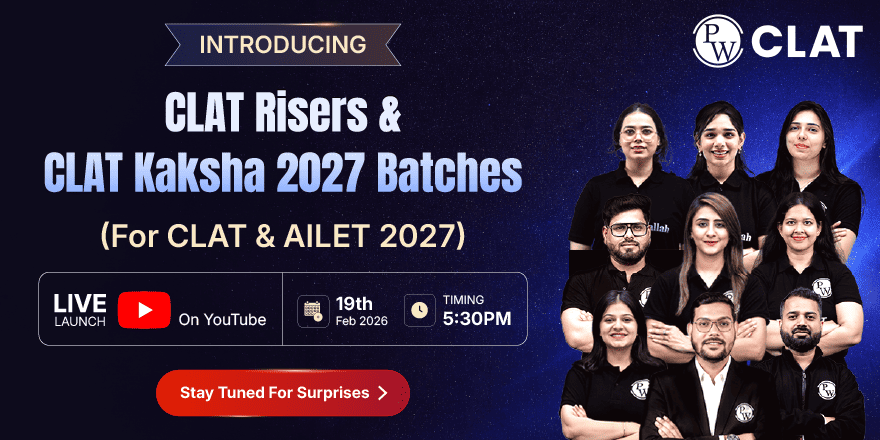
CLAT, AILET, LSAT India: For candidates interested in pursuing undergraduate and postgraduate programs in law, CLAT, AILET, and LSAT India are their leading choices. While Common Law Test (CLAT) provides admission in 24 National Law Universities (NLUs) , the All India Law Entrance Test (AILET) provides admission in only NLU, Delhi . On the other hand, the Law School Admission Test-India (LSAT-India) offers admission to various private law schools in India.
What are CLAT, AILET, and LSAT India?
CLAT (Common Law Test) is a centralized national entrance law exam conducted by coalition of National Law University (NLUs) for admissions in 24 NLUs . It includes undergraduate and postgraduate law programs to various NLUs. Except for NLU Delhi and NLU Meghalaya, it offers admission in every law school.
AILET (All India Law Entrance Test) is a national-level law exam to offer admission to candidates in the National Law University, Delhi (NLU-Delhi). It is conducted by NLU-Delhi. It offers courses 5-year integrated courses such as B.A. LLB (Hons), LL.M, and PhD programs also.
LSAT (Law School Admission Test) is a law entrance test recognized by various private schools in India for admission in courses like 3-year LLB, 5-year LLB, and LLM courses, conducted by Law School Admission Council (LSAC). It has been accepted and recognized by law schools since its establishment in 2009.
CLAT, AILET, LSAT India Exam Pattern and Syllabus
CLAT, AILET, LSAT India differ in their exam pattern and syllabus. Before sitting for the exams the candidates must familiarize themselves with the pattern and syllabus of the exam. The table below will guide them.| CLAT, AILET, LSAT India Exam Pattern and Syllabus |
| Particulars | CLAT | AILET | LSAT India |
| Mode of Exam | Offline | Offline | Offline |
| Duration | 120 minutes (2 hours) | 90 minutes (1 hour 30 minutes) | 140 minutes (2 hours 20 minutes) |
| Questions Type | Objective (based on comprehension passages) | Objective | Objective |
| Syllabus |
|
|
|
| Negative Marking | -0.25 for the wrong answer | -0.25 for the wrong answer | No negative Marking |
| Total Questions | 120 | 150 | 92 |
| Total Marks | 120 | 150 | score range 420-480 and percentile |
| Difficulty Level | Moderate to Difficult | Difficult | Easy to Moderate |
CLAT, AILET, LSAT India Eligibility Criteria
The eligibility criteria vary for the CLAT, AILET, and LSAT India exams. Having information regarding the eligibility criteria will guide candidates to choose the most suitable before applying. The following table shows the relevant statistics.| CLAT, AILET, LSAT India Eligibility Criteria |
| Eligibility Framework | CLAT | AILET | LSAT India |
| Educational Qualification |
|
|
|
| Minimum Qualifying Marks |
|
|
|
| Age limit |
|
|
|
CLAT,AILET, LSAT India Courses Offered and Application Fee
CLAT, AILET, and LSAT India offer various integrated courses like 3-year LLB, LLM, PhD, 5-year integrated LLM, and many more. A detailed report is presented below.| CLAT, AILET, LSAT India Courses Offered and Application Fee |
| Particulars | CLAT | AILET | LSAT India |
| Level of Exam | National | National | National |
| Courses Offered |
|
|
|
| Course Duration |
|
|
|
| Associated Colleges | 24 NLUs | NLU Delhi | 26 private law schools |
| Examination Frequency | Once a year | Once a year | Twice a year |
| Application Fee | General Category - INR 4,000/- Reserved Category - INR 3,500/- | General Category - INR 3,050/- Reserved Category - INR 1,050/- | INR 3,799/- |
CLAT, AILET, LSAT India Difficulty Level
CLAT difficulty level ranges from moderate to difficult. The questions consist of panoramic knowledge of English Language, Logical Reasoning, Current Affairs, General Knowledge, and Quantitative Aptitude. The candidate should have strong analytical skills.
AILET is comparatively difficult to CLAT and LSAT India. It is designed by NLU Delhi to test candidates of their law knowledge comprehensively. The candidate has to be well-read in subjects like English Language, General Knowledge, Current Affairs, Legal Aptitude, Logical Reasoning, and Elementary Mathematics(Numerical Ability). The prominent traits of candidates like logical and analytical skills are put to the test.
LSAT India is relatively easy. Candidates' knowledge of subjects such as Analytical Reasoning, Logical Reasoning-1, Logical Reasoning-2, and Reading Comprehension is tried out. The exam is conducted by Law School Admission Council (LSAC). It focuses mainly on candidates; argument skills and logical skills. Candidates who have honed their critical and logical skills can fare well in the LSAT India.
In the end the choice depends solely on the candidate which one to choose. Candidates must be well-rehearsed with all the information such as eligibility criteria, subjects, and courses offered regarding CLAT, AILET, and LSAT India. Since the syllabus is almost same for all three exams, candidates must consider the possibility of appearing in all the three tests.CLAT, AILET, LSAT India FAQs
Can I give all CLAT, LSAT and AILET?
Does NLU Delhi accept LSAT score?
Which NLU has highest placement?
Is LLB possible without CLAT?
Which campus is best in DU for law?









